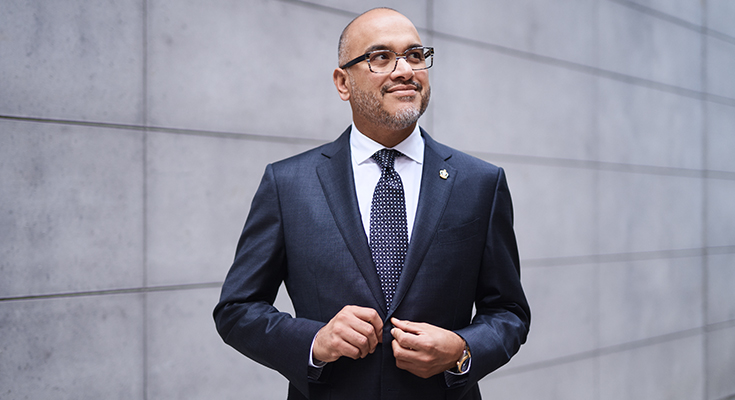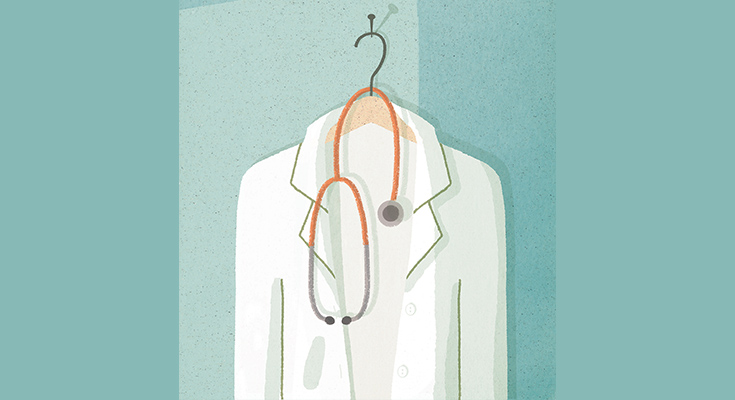
Photo credit: Arash Moallemi
By Mark Sampson
The College is pleased to welcome Dr. Ian Preyra, an emergency physician and the Chief of Staff at Joseph Brant Hospital in Burlington, as our 2024 CPSO Board Chair. Dr. Preyra comes to the role with nearly 25 years of clinical and health leadership experience, earning his medical degree from Queen’s University in 1999 and a Master of Business Administration from the Schulich School of Business at York University in 2003, among many other honours. Beyond his position on CPSO’s Board, Dr. Preyra is also chair of the Ontario Hospital Association’s Physician Leadership Network, and team emergency physician with the Toronto Maple Leafs hockey team. (“They’re going to win the Cup this year,” he insists, as he does every year.) He has also worked as a Coroner.
Yet, Dr. Preyra’s contributions to Ontario’s medical profession were nearly cut short in October 2016, when he was hit by a car while out jogging. He suffered, among other things, a traumatic brain injury from the accident, which completely upended his life. “Before then, I felt like I was pretty bullet proof,” he says. “But this was different. This was not something I could overcome on my own. It changed my whole self-concept. I was very depressed at the time, and I eventually thought to myself, ‘You either need to get on with living or get on with dying.’”
Dr. Preyra credits his recovery to his health team (which included a terrific neurologist and a wonderful psychiatrist) who helped him with physical and psychological fallout of the accident. It made him understand on a whole other level the value that physicians bring to the lives of their patients every day, and it is that deeper awareness that now informs his work as a health leader, including in his position as CPSO Chair.
“Before then, I felt like I was pretty bullet proof,” he says. “But this was different. This was not something I could overcome on my own”
Dr. Preyra grew up in Rexdale, the youngest of 10 children. His parents came to Canada in 1967 (“The last year the Leafs won the Cup,” he points out), fleeing persecution in their native India. He lost his parents at an early age, but they had a long-lasting impact and imbued him with a passion for knowledge and a desire to live a life of service, and these naturally led him to a career as a physician. He chose emergency medicine as his specialty because it was intellectually fascinating and enabled him to help people in real time, which he finds very gratifying.
Still, the vantage point of a busy emergency department has given Dr. Preyra a clear perspective on the challenges facing physicians. “I can see the sacrifices it demands of its members and their families,” he says, “and it’s the sort of sacrifices not asked of any other profession. Medicine forces you in positions of high emotional leverage, and while you get the joys of helping patients and making positive changes in their lives, you’re also there for their sorrows. I will often find myself talking to families who face life-changing tragedies, and then I have to just go on to the next patient, and the next patient. It takes an often invisible toll.”
We caught up with Dr. Preyra to discuss more about how CPSO is helping to address these challenges and his thoughts on the year ahead as Board Chair.
What are some of the specific joys of working in health leadership that go beyond the more day-to-day rewards of treating patients?
In emergency medicine, you need to have a single-minded focus on the patient in front of you. That’s what you’re trained to do. When you’re a practitioner, it’s all about clinical excellence, and it’s easy to view system constraints as simply a barrier to the care you provide. But as an administrator, you need to take a longer view, a broader perspective on that system. I’ve had to learn to forego the rewards that come from immediate patient encounters in favour of the more nebulous feeling of playing the long game to try and make the system better. You need to make decisions on what is right based on your best judgment; it can’t merely be based on what’s expedient.
And I’ve certainly seen this in my role at the CPSO. I’ve learned so much talking to people here at the College about their work and the passion they bring to maintaining the privilege of self-regulation. We really are preserving the integrity of regulation while recognizing the pressures that our members face, and we’re doing so by modernizing the governance of the College and looking at how to extend right-touch regulation for future generations of the profession.
How do we maintain our duty to the public while recognizing the stressors physicians face?
I think that is one of the questions the Board is asking. How can we make regulation as seamless and compassionate as possible and ensure that addressing concerns doesn’t cause unintended harm to the profession? How do we empower physicians to provide the best care they can? We want to make sure that, in our regulatory processes, we respond to concerns of the patient and the physician to uphold the well-earned public trust in the profession.
We also need to continue streamlining pathways to licensure and address in a meaningful way the health human resource crisis and the real concerns about physician shortages and workload, especially in underserviced areas. We have worked hard to understand and address inequities in the current health system and develop a future system with an equity, diversity, and inclusion (EDI) lens focused on traditionally marginalized or disadvantaged groups.
“We also need to continue streamlining pathways to licensure and address in a meaningful way the health human resource crisis”
The Board just approved changes to CPSO’s governance structure. Why are these changes so important?
I didn’t know much about governance before I went into leadership, so it was a real eye-opener. Modernizing governance at the College means streamlining its processes so that we embrace best practices, giving our board all the skills and competencies necessary to provide the oversight we need. Governance reform will improve the transparency between the organization and the profession. It will improve operational continuity and better enable us to execute nimbly on strategy. I also believe it will lead to more member participation and encourage physicians to take a more active role in self-regulation.
Speaking of which, you’ve served on several CPSO committees. What’s your pitch to other Ontario physicians who may be thinking of getting involved in the College’s work?
I’ve been incredibly impressed by the quality of work being done on CPSO committees. The commitment of public and physician members is so inspiring. The public can be confident that it is being well-served.
For those physicians considering getting involved, I’ll say this: Do it! Getting involved will bring so much depth and richness to your own practice. It certainly has with mine.
How did you come to get involved with the Maple Leafs?
They called me out of the blue. I was at my son’s baseball game, and they called me up and asked if I was interested in being their on-ice emergency physician. I mean, who would say no to an opportunity like that? My partner is a Habs fan, but I continue to hold out hope that she will one day see the light.
I only work home games which is wonderful in terms of my personal relationships here in Toronto and that whole work-life balance thing. It has been great. I love the Leafs and have undying faith in them.





